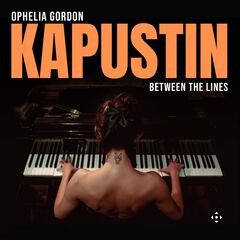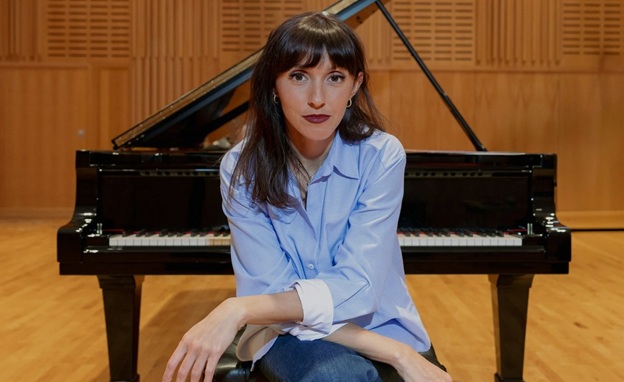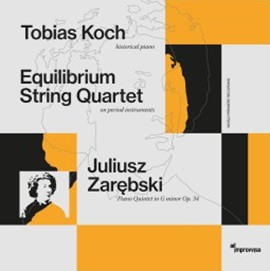Many pianists playing Kapustin come from the classical music. You are trained as a multi-style pianist. Is your connection with jazz a plus for playing Kapustin?
Without a doubt. I grew up listening to jazz from a very young age and having an awareness of the style is so important. Thanks to my mum who is also a musician, I literally watched jazz musicians perform in my living room most weekends! The jazz idioms that Kapustin uses across his composition all need to be truly felt. I wouldn’t have such a strong connection to his compositions if it wasn’t for the exposure I’ve had to jazz.
Kapustin has written scores with very precise indications for the performer. Does this in a way limit our interpretative freedom?
My understanding of being a classical artist is finding a balance between what the composer asks from us on the page, but also what we feel within ourselves. We can’t ignore the latter, otherwise we fall prey to just being a karaoke machine, like a copy cat. You’ve got to find that freedom and trust your version is worthy of sharing. I believe that Kapustin also understood that true artists will all play differently to one another. His compositions are only written in the precise way because at heart he was a classical composer. The true essence of jazz is improvisation, and as Kapustin says, ‘what is jazz without improv’. With that, I feel even more free to play exactly as I would like. The improvisatory nature of jazz should exist in classical performances too – yes, we learn notes, but how we choose to play those notes should vary every single time we play, and I think we should have complete freedom with exploring that. Remember, even the great classical composers like Chopin and Beethoven would improvise even during their performances. We shouldn’t worry so much about following the score in such a strict way. Don’t let the notes on the page stop you from playing how you like, life is too short. It’s about the balance of respect and personal creativity.
 Kapustin’s music combines jazz and classical music. The performer must be able to reproduce this. Is that actually difficult?
Kapustin’s music combines jazz and classical music. The performer must be able to reproduce this. Is that actually difficult?
To me it’s second nature, but only because I’ve been immersed in both genres my whole life. What’s hard is trusting that we can all develop an inner groove – and it will be unnatural at first if a musician hasn’t had the opportunity to express that. At times, one has to forget the classical musician and really think like a drummer or rhythm section. You have to be able to wear both hats and know when it’s appropriate to lean on either the classical or jazz feel. I wouldn’t say it’s difficult, just different! I would never actually call myself a jazz musician, because similarly to Kapustin, I study and interpret scores – which is the heart of what a classical musician does. But, that doesn’t mean you can’t have the inner spirit or soul of a jazz musician.
How do you deal with influences from, let’s say, Chopin, Rachmaninov, and Scriabin?
I’ve spent time with all these composer’s, particularly Rachmaninov, and it’s helpful to have a deeper understanding of those works before any musician tries Kapustin. He was hugely influenced by Russian repertoire, and you can hear that in the deeper resonance with his larger chords and chamber compositions. Even technically speaking, the contrapuntal writing in these composers helps develop the independence in the fingers that you need for Kapustin. In fact, since spending so much time with Kapustin, it’s even helped my understanding of his influencers writing even more. He had a strong sensitivity towards the difference of technique needed for both Scriabin and Rachmaninov, so having awareness of this yourself can help understand the exposure that Kapustin had whilst studying in Moscow.
The twenty-Four Preludes and Fugues are one of Kapustin’s most ambitious works. You did not record them all, but only a selection. Why?
Great question! I’d love to have recorded all of them, but I decided to go with eight – as a direct nod to the eight concert etudes, op. 40. I liked the idea of that symmetry when listening to the full album in one sitting. One day I would love to tackle the complete set, including his prelude and fugues, Op. 82 which are monumental and fascinating. So much Kapustin, so little time!
Which was your idea while selecting?
After analyzing the whole set of preludes, Op. 53, I went with those that not only resonated with me most, but that might be the most accessible harmonically to an audience who may be listening to Kapustin for the first time. I am particularly interested in reaching a larger jazz community, and I think these preludes have the most traditional American jazz sound. I like to think I’ve chosen those that have their own jazz pianist attached to their character – that Kapustin may have been directly influenced by. For example, prelude No. 5 I like to call ‘Bill’, and prelude No. 17, I call ‘Oscar’. I’ll let the reader figure out which jazz pianists I am referring to!

Ophelia Gordon
(c) PR
On the other hand, you play all eight Concert Etudes. What is special about those?
These are really his most recognized works and an absolute pinnacle of 20th century repertoire. I think of them less as etudes (although technically challenging), they are also character pieces, which is why they are called ‘concert etudes’ and not just ‘etudes’. They are more than technical studies. They each have an emotional landscape and energy that drives the whole set. They certainly make the most impact when you perform them as a full set. What a lot of pianists also miss is that he actually intends for etude no. 4 to 5 and No. 7 to 8 to be performed with no break in between. It was these etudes that I first discovered in Kapustin’s works. I have a strong emotional connection to them and have spent many hours with each one.
Will you one day proceed to the sonatas and to the piano concertos?
Absolutely! I’m already working on Concerto No. 5 for a performance next July at Cadogan Hall in London. I’m also hoping to record sonata No. 6 and No. 12 in the future, my two favorite sonatas. My dream is also to perform and record all of his piano and big band repertoire. The wonderful thing about Kapustin is that not only did he compose over 160 different works, but there is so much that still hasn’t been recorded. He has many different sides and I love when I come across a gem that I instantly connect with. I’m still finding more and more each day and I look forward to continuing the journey and sharing my passion for his music!






















